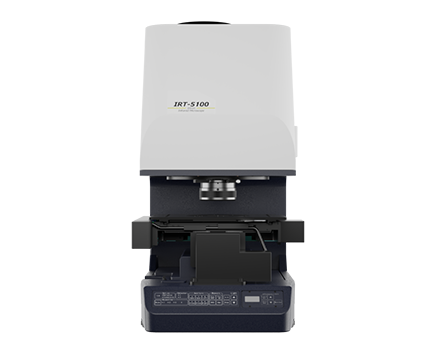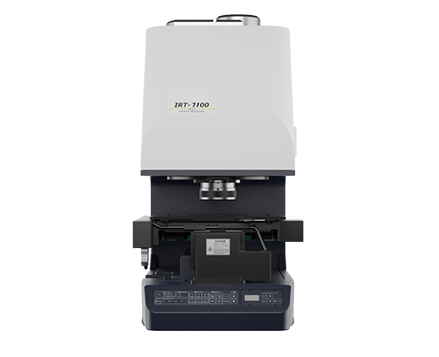IR Microscope with Heating/Cooling Stage for the Evaluation of the Melting Point or Phase Transition of a Sample at the Molecular Level
March 25, 2024
Introduction
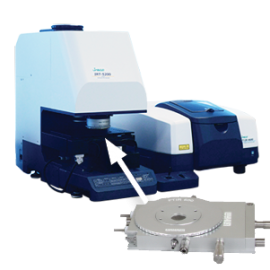
Differential Scanning Calorimetry (DSC) or Thermo Gravimetric Analysis (TGA) are generally used to evaluate thermophysical properties such as melting points or phase transitions. These techniques are used in combination with X-Ray Diffraction (XRD) to assess thermophysical properties and crystal structure.
The JASCO IRT-5000 and IRT-7000 IR microscopes can be combined with a sample heating system, MHC-5000 (Fig. 1, Chart 1), which allows changes in molecules to be measured for their thermophysical properties with image observation. The heating system uniformly heats or cools the measurement area in the IR microscope, assuring high accuracy measurement. Temperature and measurement conditions are software controlled with simultaneous image scanning and IR measurement.
| Chart 1 Temperature Control Range of Heating Stage | ||
| Model | MHC-5000 | (Option) |
| Temperature Range | Room Temperature ~ 600° C | -190 ~ 600° C |
Experimental
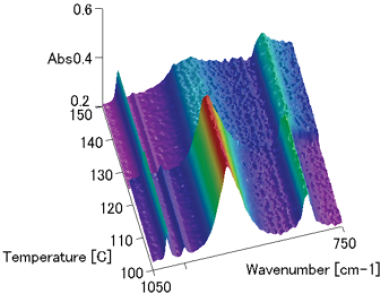
The IRT-5000 IR microscope with MHC-5000 was used to measure benzoic acid heated from 100° C up to 150° C with a ramping rate of 2° C per minute and IR spectra were obtained at 0.5˚ C intervals.
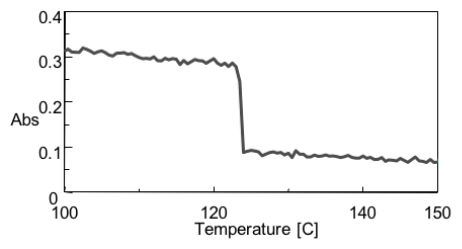
Fig. 2 3-Dimensional spectra of benzoic acid with changes in temperature, Fig. 3 change in peak intensity at 930 cm-1 versus temperature and Fig. 4 optical images of benzoic acid with the change in temperature from 120 to 125˚ C. Structural changes in the benzoic acid were confirmed between 120° C and 125° C. Since the melting point of the benzoic acid is 122.4° C*, the molecular structure change due to melting was clearly observed with this system. It can be concluded that this system is useful for measurement of thermal structural changes, such as denaturation of proteins or hardening of thermoset resins.

*Ref. Encyclopedia of Chemistry
Keywords
280-TC-0001, IR Microscope, IRT-5000, IRT-7000, phase transition, melting point, benzoic acid, thermoset resin
Featured Products

IR Microscope with Heating/Cooling Stage for the Evaluation of the Melting Point or Phase Transition of a Sample at the Molecular Level
Introduction

Differential Scanning Calorimetry (DSC) or Thermo Gravimetric Analysis (TGA) are generally used to evaluate thermophysical properties such as melting points or phase transitions. These techniques are used in combination with X-Ray Diffraction (XRD) to assess thermophysical properties and crystal structure.
The JASCO IRT-5000 and IRT-7000 IR microscopes can be combined with a sample heating system, MHC-5000 (Fig. 1, Chart 1), which allows changes in molecules to be measured for their thermophysical properties with image observation. The heating system uniformly heats or cools the measurement area in the IR microscope, assuring high accuracy measurement. Temperature and measurement conditions are software controlled with simultaneous image scanning and IR measurement.
| Chart 1 Temperature Control Range of Heating Stage | ||
| Model | MHC-5000 | (Option) |
| Temperature Range | Room Temperature ~ 600° C | -190 ~ 600° C |
Experimental

The IRT-5000 IR microscope with MHC-5000 was used to measure benzoic acid heated from 100° C up to 150° C with a ramping rate of 2° C per minute and IR spectra were obtained at 0.5˚ C intervals.

Fig. 2 3-Dimensional spectra of benzoic acid with changes in temperature, Fig. 3 change in peak intensity at 930 cm-1 versus temperature and Fig. 4 optical images of benzoic acid with the change in temperature from 120 to 125˚ C. Structural changes in the benzoic acid were confirmed between 120° C and 125° C. Since the melting point of the benzoic acid is 122.4° C*, the molecular structure change due to melting was clearly observed with this system. It can be concluded that this system is useful for measurement of thermal structural changes, such as denaturation of proteins or hardening of thermoset resins.

*Ref. Encyclopedia of Chemistry
Keywords
280-TC-0001, IR Microscope, IRT-5000, IRT-7000, phase transition, melting point, benzoic acid, thermoset resin

 Download This Application
Download This Application